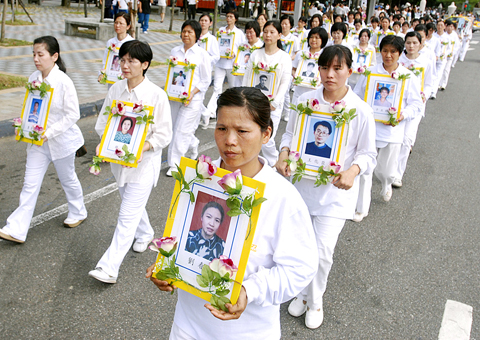More than 1,000 Falun Gong practitioners staged a protest yesterday against China’s persecution of the movement over the past 10 years.
Led by a marching band, protesters held banners and signs as they departed from a park across the street from Taipei 101.
“Ending the Chinese Communist Party [CCP] regime is the only way to end the persecution,” one sign read, while a banner said: “Supporting human rights in China is supporting freedom for Taiwan.”

PHOTO: AP
Several hundred people each held a photo of a Falun Gong practitioner who they said had died at the hand of Chinese officials, while others enacted how Chinese authorities allegedly torture Falun Gong practitioners or harvest their organs.
“This July 20 marks the 10th anniversary of the persecution of Falun Gong practitioners in China,” Taiwan Falun Dafa Association member Liao Hsiao-lan (廖曉嵐) said. “Every year, Falun Gong practitioners around the world stage demonstrations around this date to protest against the persecution and to remember the victims.”
On July 20, 1999, the Chinese government formally declared Falun Gong an “evil cult,” outlawed Falun Gong organizations and began to crack down on practitioners.
Liao said that more than 100,000 practitioners have been put in jails in China and that more than 3,300 practitioners had died in prison.
Similar demonstrations are being held in 30 other countries.
“We often pay too much attention to economic development in China and the positive impact it may bring, but not enough attention to the dark side of China, such as human rights violations,” said Wu Ya-ting (吳雅婷), who has practiced Falun Gong since 2000. “As a practitioner, I hope such events will raise public awareness.”
Despite being partially paralyzed and having difficulty speaking, an elderly practitioner stood on the sidewalk with the help of a walker and handed out flyers.
When asked why he went to so much effort, he gave a “thumbs up” sign and slowly said: “It’s good.”
A woman surnamed Hsiao said she would take part in protests “for as long as China represses Falun Gong practitioners.”
Chairman of the Deng Liberty Foundation and long-time human rights activist Kenneth Chiu (邱晃泉) also expressed support for Falun Gong practitioners.
“The Chinese government’s persecution of Falun Gong is simply ridiculous,” Chiu said. “If Falun Gong is an evil cult, why is it no problem to practice it in other countries and in Hong Kong?”
He said any government that declared a religion illegal not only violated religious freedom, but also other rights such as the right to assemble, to preach and to spread teachings.
As the protesters marched, several Chinese tourist groups were either getting ready to enter or leave the Taipei 101 building across the street. Most of them stood and watched, took pictures or simply ignored the protest.
One complained that it was “bad luck to run into something so disgusting.”
Also See: Falun Gong, 10 years after the ban

A Ministry of Foreign Affairs official yesterday said that a delegation that visited China for an APEC meeting did not receive any kind of treatment that downgraded Taiwan’s sovereignty. Department of International Organizations Director-General Jonathan Sun (孫儉元) said that he and a group of ministry officials visited Shenzhen, China, to attend the APEC Informal Senior Officials’ Meeting last month. The trip went “smoothly and safely” for all Taiwanese delegates, as the Chinese side arranged the trip in accordance with long-standing practices, Sun said at the ministry’s weekly briefing. The Taiwanese group did not encounter any political suppression, he said. Sun made the remarks when

The Taiwanese passport ranked 33rd in a global listing of passports by convenience this month, rising three places from last month’s ranking, but matching its position in January last year. The Henley Passport Index, an international ranking of passports by the number of designations its holder can travel to without a visa, showed that the Taiwan passport enables holders to travel to 139 countries and territories without a visa. Singapore’s passport was ranked the most powerful with visa-free access to 192 destinations out of 227, according to the index published on Tuesday by UK-based migration investment consultancy firm Henley and Partners. Japan’s and

BROAD AGREEMENT: The two are nearing a trade deal to reduce Taiwan’s tariff to 15% and a commitment for TSMC to build five more fabs, a ‘New York Times’ report said Taiwan and the US have reached a broad consensus on a trade deal, the Executive Yuan’s Office of Trade Negotiations said yesterday, after a report said that Washington is set to reduce Taiwan’s tariff rate to 15 percent. The New York Times on Monday reported that the two nations are nearing a trade deal to reduce Taiwan’s tariff rate to 15 percent and commit Taiwan Semiconductor Manufacturing Co (TSMC, 台積電) to building at least five more facilities in the US. “The agreement, which has been under negotiation for months, is being legally scrubbed and could be announced this month,” the paper said,

Japan and the Philippines yesterday signed a defense pact that would allow the tax-free provision of ammunition, fuel, food and other necessities when their forces stage joint training to boost deterrence against China’s growing aggression in the region and to bolster their preparation for natural disasters. Japan has faced increasing political, trade and security tensions with China, which was angered by Japanese Prime Minister Sanae Takaichi’s remark that a Chinese attack on Taiwan would be a survival-threatening situation for Japan, triggering a military response. Japan and the Philippines have also had separate territorial conflicts with Beijing in the East and South China